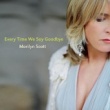The Great American Songbook is music's version of the beaten path. Nearly every serious recording artist feels the need to walk down the path that takes them into the territory of Berlin, Gershwin, Ellington, Strayhorn and Porter. There's good reason for that. Those songs fused the elements of great songwriting - witty, conversational lyricism that captured the zeitgeist of the age in which the songs were written and melodies that are both complex and simple. Jazz musicians continually return to these songs because the melodies allow them the kind of improvisation and creativity that makes jazz the American classical music. Singers gravitate to the lyricism of the songs made famous by Sinatra and Fitzgerald. These days, it seems that everyone is making an album of standards, and that can be a problem. There are so many people singing these songs that an increasingly jaded music buying public can start to tune them off.
That presents a challenge to artists such as Marilyn Scott. Those artists have to find a way to make the standards fresh and new. That can be done through interesting and compelling arrangements, great vocals, by expanding the list of tunes that can be considered a part of the canon or by veering into some traveled parts of the path to discover some seldom recoded songs.
Scott does all of these things on her latest CD, Every Time We Say Goodbye. Scott is part of that breed of jazz singers looking to expand the number and types of songs that are considered to be standards. Scott does this by rendering a jazz interpretation of a song like "Do You Know the Way to San Jose." Burt Bacharach's song certainly stands up lyrically. And the decision to give the song a Brazilian bossa nova feel is definitely a different arrangement for the song that serves as a launching pad for a jazz experimentation.
Scott returns to those familiar standards on Every Time We Say Goodbye. Sometimes, Scott sticks to performing familiar songs such as "Autumn in New York" and "Caravan" in the classic arrangements that are familiar to jazz songbook fans. However, Scott takes the time to sing tunes that don't turn up on every rendition of the Songbook. Tracks such as "I Got Lost In His Arms," "Detour Ahead" and Lonely Town," are definitely a part of the Songbook era. However, none of these songs are in danger of being done to death, and that's what makes them all welcome additions here.
Finally, a word must be said about Scott's singing. A jazz pianist told me that the thing that made him a big fan of Nat King Cole is that that the singer had perfect phrasing and enunciation. Cole understood that the lyrics were the strong point of these songs, and that his vocals served as the vehicle to make sure that people heard and understood them. Cole sang them, but he didn't get in the way vocally. Cole didn't employ vocal gymnastics and he made sure that the listener understood every word. The same can be said of Scott's phrasing and enunciation on this album.
By Howard Dukes

